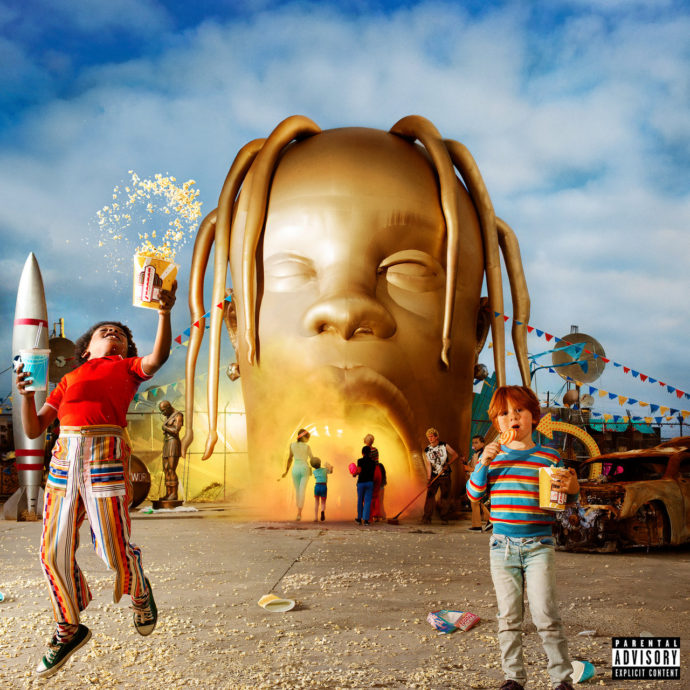There has never been a Travis Scott project that didn’t make me say “What is this?” Astoundingly, almost each time I’ve said that, it’s had a different inflection. With Days Before Rodeo, I said it with a kind of mesmerized awe, and with Birds in The Trap, I said it with a kind of shocked but clearly disappointed sigh. Astroworld is no different. However, this time, it sounded a lot like the way I reacted to Rodeo: excited, but not as thrilled as I had been with Days Before Rodeo.
In keeping with the amusement park motif, Astroworld is like Rodeo if it stood in front of a funhouse mirror. Almost matching the debut in track number, this new album seems to be updating that album, placing emphasis on the trap sounds used on “Birds in The Trap” and minimizing the dark sonic architecture of Days Before Rodeo. While, personally, I feel the emphasis and minimization should be swapped, Astroworld feels like the album Birds in the Trap should have been; it’s almost like a direct descendent of Rodeo and Days Before Rodeo while Birds in the Trap felt like a stepson.
“Stargazing” doesn’t exactly give you that impression as the first song, until you begin to notice the use of pitch shift and then you’re hit over the head with it when the beat flips from atmospheric trap to a rush of erratic synths. From there, the first half of “Astroworld” is in many ways the roller coaster ride Travis advertised it to be with is warning “Just BUCKLE UP.” A gorgeous Frank Ocean feature shocks you on “Carousel,” especially since the instrumental uses this grating Beastie Boys sample, turning the song into an impressive juggling of Frank’s sonic beauty and Travis’ abrasive approach to rap. Drake even comes through with one his best verses since he blessed Blocboy JB’s entire career, while Travis continues this interesting technique of interweaving vocals, as well as switching beats and verses at unique places.
One could go on forever about the prettiness of “Wake Up,” both in The Weeknd’s singing and Travis’ return to his original use of autotune, or his manipulation of Swae Lee’s vocals on “R.I.P Screw” in order to create a smooth cut, but the problem is that it doesn’t go on forever. Around “NC-17,” the songs begins to dip into more a generic trap feel, despite still managing to have enough going for them to still be just a bit above the likes of Future or Rich the Kid. It’s not so much that they’re bad songs, but rather that sheer epicness of songs like “Stop Trying to Be God,” this album’s best song, make those songs feel underdeveloped. The album gets this lopsided feel when we’re hit with the harmonicas, beat switches, and vocal tricks all in the first half only for it to lose its breath half way through. Maybe Travis intended to replicate that roller coaster feel by giving such a rush of sonic energy at the beginning only to mellow out like a roller coaster after the first big hill, but that doesn’t make it less disappointing.
However, as stated before, the second half still had a good amount of energy to it. “Can’t Say” has one of the best melodies on the album, perhaps even the catchiest, while “Coffee Bean” is the first time the lyrics on a Travis Scott song seem as significant as the lonesome guitars ringing out in the instrumental. The being said, what is Nav doing? Not necessarily on this album, just in general. Why is he so quiet? I’m not complaining because his “Yosemite” verse could never match Travis or Gunna, but why is it such a low quality recording? The world will never know.
There will never be another Days Before Rodeo. I’ve accepted that. But this is still good. Yet, I can’t listen to a song like “Stop Trying to Be God” and not feel some hope that Travis is still this melodic architect, thoughtfully using these almost religious vocals at the end while managing to beautifully use the same harmonica samples to create two very different moods on each half. Travis will always be Travis. That is what gives me hope going forward.
Rating: 8.0/10

